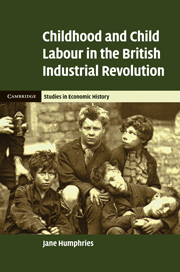6 - Wider kin
Published online by Cambridge University Press: 06 December 2010
Summary
Introduction
Although most autobiographers' early lives were dominated by parents and siblings, this did not preclude meaningful relationships with grandfathers and grandmothers, uncles, aunts, cousins and other relatives. This chapter asks what roles wider kin played in children's lives and particularly how wider kin both protected children from and prepared them for the world of work.
The conventional starting point for discussion of kin ties has been the frequency of household extension. Mortality, separation, abandonment and even mobility in search of work left many nuclear households without a male head, and since men were families' main support, such loss was potentially catastrophic. Mothers also died, and as fathers found it difficult if not impossible to be both breadwinners and carers, this too threatened family break-up. Other, less desperate circumstances such as unemployment, eviction and illness left families and individuals needing help. One possible source of support was wider kin with whom asylum could be sought. As earlier chapters suggested, despite the dominance of nuclear households, a number of autobiographers' families opened their doors (and their hearts) to other kin and even (though rarely) to non-kin. This chapter looks at the frequency of and motives for family extension from the other side: the supplicants' standpoint.
While shelter was the most valuable kind of informal assistance, it also took other material and non-material forms. Together these were usually insufficient to preclude the need to apply for poor relief (Horden and Smith, 1998; Horrell and Oxley, 2000; Saaritsa, 2008a,b).
- Type
- Chapter
- Information
- Childhood and Child Labour in the British Industrial Revolution , pp. 151 - 171Publisher: Cambridge University PressPrint publication year: 2010

